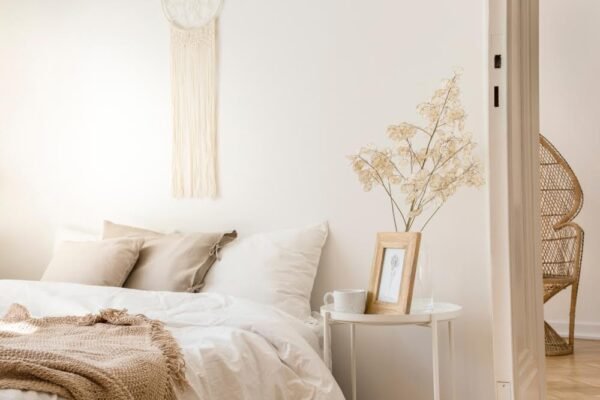
Did you know that nearly half of Brits have trouble falling asleep? Whilst many factors can contribute to these challenges, one often overlooked is the quality of our bedding.
Conventional bedding materials, with their synthetic fibres and chemical treatments, can create an unfavourable sleep environment, hampering our ability to relax and unwind. Natural bed linen, on the other hand, offers a range of benefits that can address your sleep issues head-on.
To help, the bedding experts at Happy Beds have created a guide outlining the four most popular natural bedding types and their unique advantages, allowing YOU to select the most suitable option based on your specific sleep needs.
Do you suffer from severe night sweats at night? Switch to silk bedding.
Silk is a fibre naturally produced by silkworms and then turned into a fabric that can be used for clothing, curtains, bedding and more. This means that silk is sustainable and eco-friendly, as no chemicals are involved in producing silk. Silk takes a long time to be created, as it relies on whatever silkworms can make, which is why silk often comes with a price tag.
But what about its benefits when it comes to sleep? Like wool, silk bedding is also great at regulating temperature despite how thin it feels. It’s also pretty absorbent, but you’ll likely need to take care when washing it, as water can weaken the fibres. Another great benefit is that silk is very lightweight, and this, in turn, makes it very breathable. This means that it will help keep your temperature down as you sleep!
For those who like to keep their hair manageable, we’d recommend silk pillowcases. A silk pillowcase is naturally very smooth to the touch, meaning you will wake with hair that is more manageable in the mornings, especially if you don’t use a hair bonnet.
Do you have sensitive skin? Bamboo is the best natural bedding type for you.
Bamboo bedding is, as the name suggests, made from bamboo fibres. This makes it sustainable, as bamboo grows quickly and is easy to replenish.
But what about the sleep benefits? Well, bamboo bedding offers plenty of those and is temperature regulating (notice a theme with natural bedding?); bamboo also offers a smooth texture that is exceptionally comfortable and unique compared to other fabrics. An extra benefit to this is that bamboo bedding is often a more economical option than silk bedding whilst still giving you a similar feeling.
Bamboo bedding is a must-have for sensitive skin as it is naturally hypoallergenic – with bamboo fibres being resistant to bacteria and allergens. They’re also great for anyone who wants to keep their bedroom smelling fresh, as bamboo fibres contain a unique antimicrobial agent called bamboo kun. This agent prevents bacteria and other odour-causing microorganisms from growing!
Are you on a budget? Linen is best as it’s long-lasting and antibacterial, too.
One of the oldest fabrics in the world – and you know it’s got to be good if it’s been around since the Ancient Egyptians – linen bedding offers plenty of fantastic sleep benefits. Besides being breathable and temperature regulating – a common feature of natural bedding, you’ll notice – linen bedding is exceptionally hygienic. Being both antiseptic and antibacterial, linen is often considered one of the cleanest fabrics and actively works to prevent bacteria from growing!
Choosing linen bedding can also work out in the long term, as it is 30% more durable than cotton! They also soften over time, so the longer you have them, the comfier they’ll end up.
